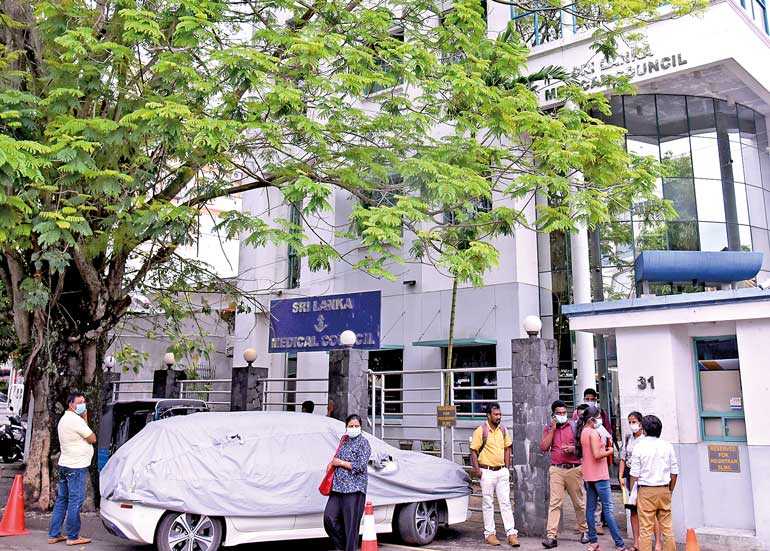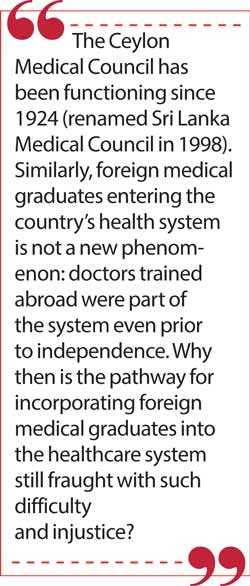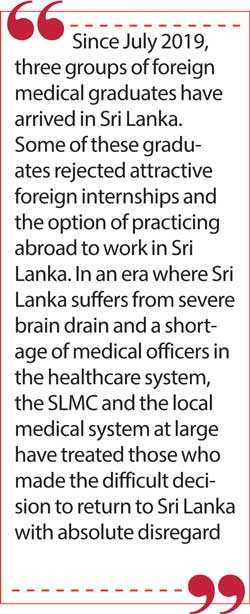Tuesday Feb 17, 2026
Tuesday Feb 17, 2026
Tuesday, 22 September 2020 02:00 - - {{hitsCtrl.values.hits}}

Only a thoroughly disorganised institution would call for applications without setting the exam dates. Such disorganisation, however, is characteristic of the SLMC’s actions over the past years. This has repeatedly disadvantaged thousands of foreign medical graduates, including the current group of foreign graduates awaiting this phantom exam – Pic by Ruwan Walpola
Starting from 24 August 2020, the Sri Lanka Medical Council (SLMC) asked foreign medical graduates to apply for the Examination to Register to Practice Medicine (ERPM), parts A and D. Hundreds of graduates lined up outside the SLMC, paid the due fee of Rs. 20,000, and promptly completed their registration for an exam for which they had already waited for over a year.
 Even though the SLMC had not declared the dates for the exam, they – reasonably – assumed it would be held within at least two months from the date of application. But the latest information from the SLMC suggests that the exam could be postponed indefinitely.
Even though the SLMC had not declared the dates for the exam, they – reasonably – assumed it would be held within at least two months from the date of application. But the latest information from the SLMC suggests that the exam could be postponed indefinitely.
Only a thoroughly disorganised institution would call for applications without setting the exam dates. Such disorganisation, however, is characteristic of the SLMC’s actions over the past years. This has repeatedly disadvantaged thousands of foreign medical graduates, including the current group of foreign graduates awaiting this phantom exam.
Further, the SLMC has also been engaged in unending legal battles across multiple fronts. These cases have caused additional delays and distress to foreign medical graduates who have on occasions had nothing to do with them.
The Council often violates its own codes. For instance, the SLMC issued a degree approval letter to all the foreign graduates who are now waiting for the ERPM, upon our graduation, clearly stating that all four parts of the ERPM (A, B, C, D) will be held twice a year. However, the SLMC has not conducted Part A and Part D of the ERPM since July 2019.
The SLMC also repeatedly makes decisions that brazenly violate the country’s laws governing the medical practice as codified in the Medical Ordinance. This has resulted in a string of legal applications against the Council in the Appellate Courts. The courts have invariably ruled in favour of the petitioners, only for the Council – in a few cases – to then violate the rulings. 
An illustrative example is the SCFR 54/2019 fundamental rights application filed by the group of 83 graduates from the South Asia Institute of Technology and Medicine (SAITM). The petitioners sought relief from the court against the SLMC’s arbitrary refusal to register them as provisional members of the practice, in violation of an earlier Supreme Court ruling.
The resulting interim order prevented the internship of more than a hundred foreign medical graduates who were not a direct party to the dispute and had fulfilled SLMC’s criteria for commencing medical internship. The affected graduates had to intervene as respondents, incurring legal expenses, to secure their training. This caused a further three-month delay to their eventual internship appointment, after having waited nearly a year to sit for the ERPM after graduating.
The SLMC, in late 2018, sought to prevent a few foreign medical graduates from completing the ERPM – after these graduates had already sat for a significant portion of the exam following admission by the same Council – by retrospectively imposing a new arbitrary pre-entry Advanced Level qualification midway. When the affected students challenged this at the Supreme Court under cases SCFR 145/2019 and SCFR 149/2019, the resulting interim order prevented the results of the completed exam portions from being released.
Eventually, the Supreme Court held with the Petitioners and ruled that the Council had acted arbitrarily in imposing a pre-entry qualification overriding the purview of powers which has been granted to it by the Medical Ordinance. These cases caused an additional four-month delay in the internship appointments for the hundreds of foreign medical graduates who had met even the new pre-entry requirement.
In the lead up to the first session of ERPM for 2019, the SLMC once again blocked several other foreign graduates from sitting for the ERPM based on an earlier pre-entry qualification it had set in 2010; in contravention to the current pre-entry qualification for medical education approved elsewhere in law by Parliament. 
The victims challenged the matter in court and the case is purportedly the reason for not conducting Part A and Part D since July 2019, even though the court had not issued an interim order preventing the timely conduct of the ERPM for the remaining qualified candidates in the batch.
In four separate responses to an RTI request by some of these candidates, however, the SLMC attributed the delay to the pending court case and a non-existent stay order imposing the same. The Supreme Court delivered its verdicts on these cases (SCFR 399/19, SCFR 400/19, SCFR 442/19, SCFR 443/19, SCFR 444/19, SCFR 459/19) on 23 July 2020, ruling that the SLMC being a creation of the Medical Ordinance has no authority to set entry criteria for foreign medical universities in violation of the provisions of the Medical Ordinance and ordered the SLMC to grant permission to petitioners to sit for the exam.
Since July 2019, three groups of foreign medical graduates have arrived in Sri Lanka. Some of these graduates rejected attractive foreign internships and the option of practicing abroad to work in Sri Lanka. In an era where Sri Lanka suffers from severe brain drain and a shortage of medical officers in the healthcare system, the SLMC and the local medical system at large have treated those who made the difficult decision to return to Sri Lanka with absolute disregard.
When the statutory body established for the purpose of maintaining the ‘academic and professional standards, discipline and ethical practice’ of the medical profession in the country conducts itself in this unruly, arbitrary manner, it calls into question the integrity of the profession itself.
The apex court of this country has repeatedly found the SLMC’s positions on key questions such as: (i) Should there be a minimum Advanced Level results requirement for registering foreign medical graduates? (ii) Should universities that accept students that do not meet SLMC’s own pre-entry Advanced Level results requirements remain recognised the by SLMC? (iii) Should graduates from (local) private medical colleges be able to practice? – to run foul of the Medical Ordinance.
In multiple rulings, the Supreme Court has reprimanded the SLMC for usurping the powers of the Parliament, ultra vires enacting arbitrary rules that violate principles of natural justice, and failing to uphold constitutionally guaranteed equality of treatment, in particular, for foreign medical graduates.
The Ceylon Medical Council has been functioning since 1924 (renamed Sri Lanka Medical Council in 1998). Similarly, foreign medical graduates entering the country’s health system is not a new phenomenon: doctors trained abroad were part of the system even prior to independence.
Why then is the pathway for incorporating foreign medical graduates into the healthcare system still fraught with such difficulty and injustice? Is it fair for the SLMC to hold as hostage those foreign medical graduates who have fulfilled its own arbitrary standards, citing pending cases filed by petitioners disadvantaged by the same contradictory rules? Why should hundreds of foreign medical graduates, despite meeting every requirement, pay the price for SLMC’s failure to operate within the framework of the Medical Ordinance?